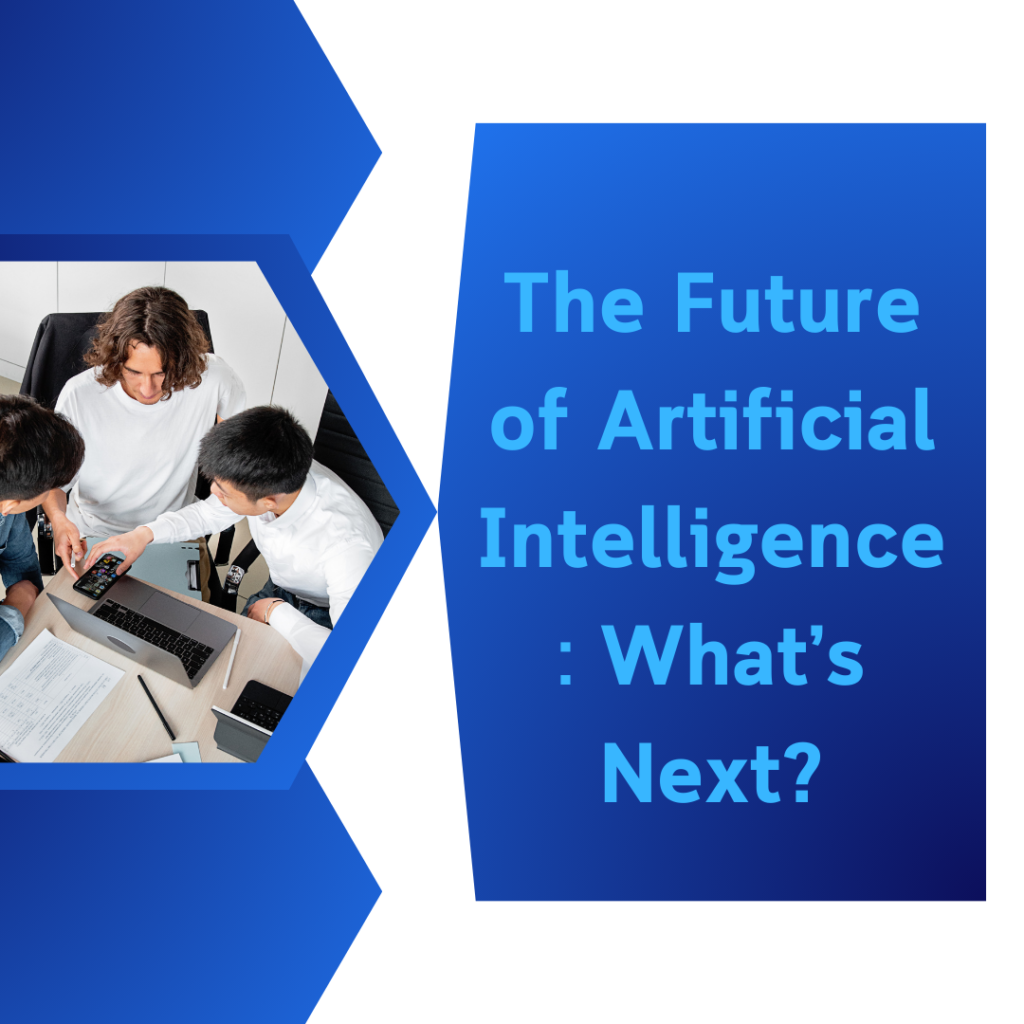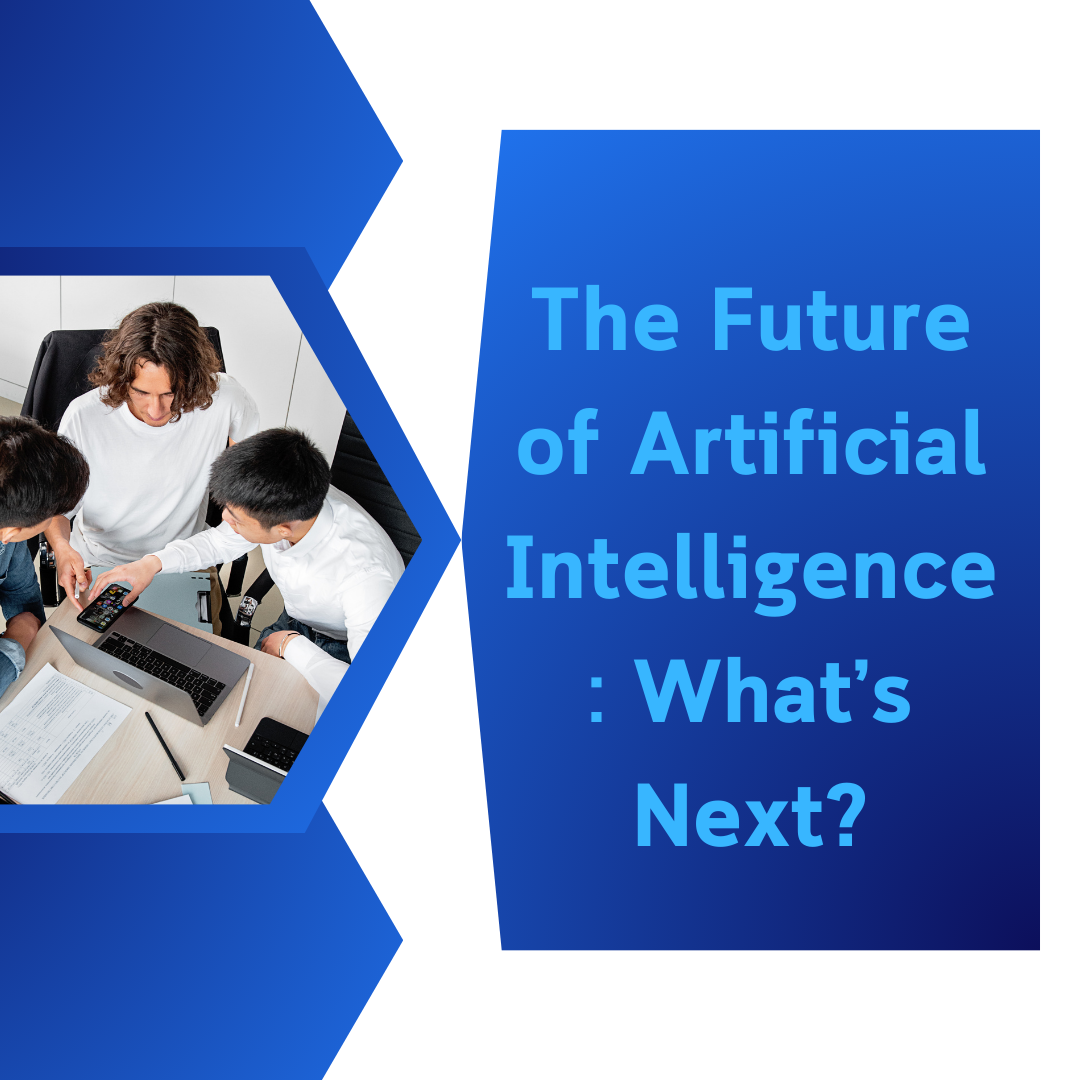The Future of Artificial Intelligence: What’s Next?
From healthcare to finance, from entertainment to transportation; AI has made its dent in every industry across the globe. It was futuristically imagined once, but has now rapidly transformed into an integral part of lifestyles. Each following year brings newer and sharper advancements in AI systems that have the potential to transform the mundane way of living, working, and relating with each other into something entirely different. The Future of Artificial Intelligence: What’s Next?. As we look to the future now, the question has turned to what might come next for artificial intelligence. Indeed, what trends and advancements may have forthcoming challenges?
This is a future of artificial intelligence, the improvements anticipated along the way, and how some of these challenges will be overcome along the way; it is also a look into some of the ethical considerations that the growth of this technology imposes on society. Be it on the wider backdrop of its societal impacts or the specificities of AIs role in automation, the healthcare industry, or, in fact, broader ethics, all people, organizations, and policymakers want to know where AI is headed.
Generative AI
The term refers to those algorithms which are capable of making new content like text, draws images, creates music, or generates videos from existing data. Large-language models such as OpenAI’s GPT series and images generation; for example, DALL-E fall within this definition.
Generative AI will progress further during the years to come, with AI systems expected to produce even entirely new forms of media, which would provide creativity and personalisation. An example of using such technology is to generate personalised learning materials, advertisements. Even building virtual worlds for entertainment purposes in gaming.
1. The Evolution of AI Technology
The concept of artificial intelligence has made great strides since John McCarthy created the word in 1955. Millions of years from then, AI has achieved phenomenal breakthroughs. The first AI systems were designed for very simple functions such as playing Chess or solving mathematical problems up to a point. Then came the years of gradual evolution during which these systems started formulating much more colorful algorithms with large-scale data sets to carry out much more sophisticated, advanced functions such as image recognition, speech recognition, language translation, and even diagnoses in a medical context. The Future of Artificial Intelligence: What’s Next?
The most improbable advances made to date may yet find themselves programmed into artificial intelligences, ushering in the era of incomparably advanced systems performing once impossible tasks. The main developments from which one would have to configure its future are:
Deep Learning and Neural Networks
It’s recent developments in Deep Learning that proved to be among the greatest achievements in AI. This involves giving a large volume of data to an artificial neural network for training to recognize patterns and make decisions. It mirrors the structural engineering of the human brain in order to make learning possible and improve it through time.
Deep learning applications run longer than that, from algorithms that check for faces to cars that drive themselves. These systems promise a future of learning from less structured data-such as pictures or recordings or even cries-just as a resemblance to human-likeness perception enables them to do engaging and interesting tasks.
2. AI in Automation: The Workforce of the Future
The most important apparent implications of AI automation. It goes beyond manual drag used in today’s societies to facilitate transportation of products.
Intelligent Machines
The proliferation of intelligent systems is one of the many key developments in this area of artificial intelligence. Much more development is envisioned for applications in this realm for used technologies primarily such as self-directed vehicles, cars, trucks, and drones.
Autonomous vehicles are still in their initial stages of development, while many companies, including Tesla, Waymo, and Uber, already have test pilots on the road using such cars, as regulations slowly start to get established. As artificial intelligence advances, more wonders will be expected from autonomous systems that address air travel, personal mobility, and public transport. The Future of Artificial Intelligence: What’s Next?
AI and the Future of Work
The infusion of artificial intelligence in the workforce presents both a boon and a bane. On one hand, AI may improve human productivity and reality would then have eliminated all repetitive or mundane tasks. That would occupy an employee typically busy for something creative or strategic work. It can be expected that new jobs will appear in areas like devoting themselves to AI, analyzing data, and sharing responsibility with AI models.
The other aspect of the coin could probably lead to massive displacement of jobs in the area in which process-repetitive tasks are programmed for automation. This includes industries such as retail, manufacturing, and customer service, leaving most workers having to learn new skills to still be competitive in this AI-driven market of jobs.
The state of things in the future will actually act on artificial intelligence and automation in a way that finds the balance. Between the two elements, human labor, and machine application. Because of this situation, it may call upon policymakers and business organizations to provide funding for retraining programs and ensure that laborers are well prepared with all the skills needed to thrive in the age of artificial intelligence. Therefore, there will be such a different future of work as it will be characterized by more co-working between man and machine, the AI systems being tools to supplement human decision-making and creation.
3. AI in Healthcare: Revolutionizing Medicine
The most promising of AI research has come in healthcare. Such capabilities can transform the medical field, resulting in better outcomes for patients, improved diagnostics for conditions, and streamlined administrative processes.
Diagnostics Powered by AI
AI has come up to speed with medical diagnostics. Imagine machine learning algorithms making possible the recognition of abnormalities in images such as X-rays, CT scans, or MRIs and assisting doctors with improved diagnosis. In the future, it is quite apparent that AI will be one of the significant indispensable parts in recognizing diseases at an earlier date, especially for cancers and heart diseases, as well as several neurological disorders.
For instance, one can also use AI to predict patient outcomes on clinical situations as derived from electronic health records. This ensures that they can help in delivering treatments more accurately. AI models will know which patients are at a higher risk of some conditions and allow for early interventions.
AI-Driven Drug Discovery
Another great development in AI is drug discovery. The process of drug development has been time-consuming and expensive to date. However, artificial intelligence algorithms are making it possible to analyze large amounts of data in identifying drug candidates in a short time. Machine learning algorithms provide an avenue to simulate interactions. B etween different compounds, thus enabling researchers to predict the possible action of a compound to a human organism.
It could be beneficial for the future if AI could do personalized medicine, which develops treatment strategies tailor-made to fit an individual’s genetic characteristics, lifestyle, and medical history. The future would be even brighter for such treatment efficacy.
Robots in Surgery with AI
Robot-AI marriages have already shown an application in surgery. Robot systems become an assistance tool for the surgeon during the operation, as one can increase precision and reduce the chances of human error. While speeding up the recovery process for patients. Thus, the more rapid development of artificial intelligence continues, and soon robots will insect precision in surgeries.
4. AI Ethics: Responsible Development
The more advanced the AI technology becomes, the more ethical issues arise around it. Privacy and algorithmic bias are only two of the difficulties that have to be addressed so that the development of this technology would benefit human society. As a whole.
Algorithmic Bias.
The need for algorithmically negligent exceeding pretty much all other concerns raised in AI. Hence the AI systems will definitely reflect some inherent biases. Example includes facial recognition systems that would seem to show higher error rates for people other than Caucasians. Recruitment algorithms also favor male candidates rather than female ones.
As AI becomes more widespread, it is essential to ensure that algorithms are fair, transparent, and free from bias. Developers must actively work to eliminate bias from training data and implement safeguards to ensure that AI systems do not perpetuate harmful stereotypes or discrimination.
Concerns of Private Nature
The functioning of artificial intelligence often implies utilization of thousands and thousands of personal data. Which leads to privacy and data protection concerns. Such technologies include facial recognition, voice assistants, and surveillance systems. So it is also urgent to develop a clear guideline and regulation for guaranteeing its users’ private lives.
The kind that will inevitably make a whole lot of individuals gasp in surprise since it guarantees individuals a right to personal control over their data. While holding companies responsible concerning. The how and where they have gathered such information.
Accountability and Control
Accountability is yet another ethical issue which confronts AI. An AI system makes a mistake or causes some harm. If a self-driving car crashes into someone, is it the manufacturer who is at fault, or is it the software developer.
For accountability in AI development and application in a responsible way, clear guidelines are to be followed regarding accountability, and there should also be transparency. In what the AI systems have employed in making decisions. As a result, there needs to be a solid legal and regulatory framework covering all such concerns.
5. The Global Impact of AI: Opportunities and Challenges
Artificial Intelligence does have the possibility of creating considerable global opportunities; it also has its own unique challenges. AI would exert its impact as it evolves globally across sectors, even in economics, education, and international relations.
EDUCATION IN AI
The education system could become a personal experience for everyone using AI in the years to come. AI-based tutoring systems can customize lessons for each individual and allow him/her to learn slower or faster and sending immediate feedback. Another application of AI is to provide data to educators on students. Who may require specific target interventions when they start showing possible signs of lagging.
Economic Effects
The aspect of the global economy directly or indirectly to the effects of AI considered pretty closely. Growth of the economy progressing forward with an increase in productivity and creating new industries is one possible outcome of AI. On the other hand, broad-based employment dislocation would result from automated production processes replacing blue-collar workers. When it comes to retraining potential workers for future jobs, governments and organizations will need to collaborate optimally.
International Relations and AI
Leadership in AI R&D would provide competitive edge, thus modeling another form of the new global power structures.
Final words
On one hand, the shining side of an artificial intelligence future makes the entire picture electrifying. While raising many uncertainties at the same time. Evolving such that, the mesmerizing future revolutionizes industries, enhances lives. And promises new solutions to some of the world’s most major problems; one downside. However, is that it carries a very fast pace of development and brings more ethical, social, and economic challenges along with it. The Future of Artificial Intelligence: What’s Next?
It’s really up with the more responsible development and application of the miracle-man of science. A government, a private business, and citizens to pollinate. In finding critical solutions-from algorithmic bias and data privacy to accountability and so on. The way forward would shed light only to guide us. To use AI in a manner that satisfies the final greater good-society in whole.
Indeed, in the future, AI will affect the world beyond our imagination. The balance of learning allowed with safety practice is important for the expected future. Where what is right or what is advantageous is also unsafe for society. The answer to “What next for AI?” is complex, but majorly. It is going to be one of the expensive and most exciting journeys in the life of this millennium.


